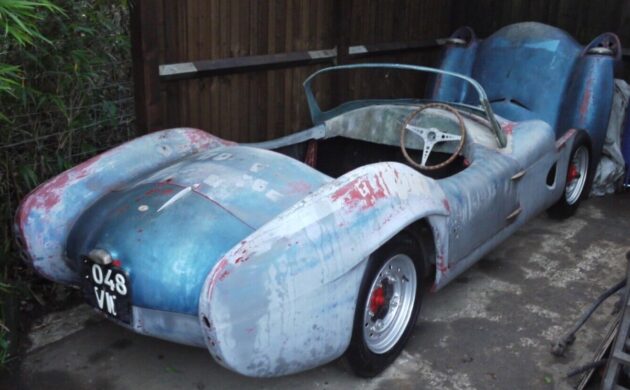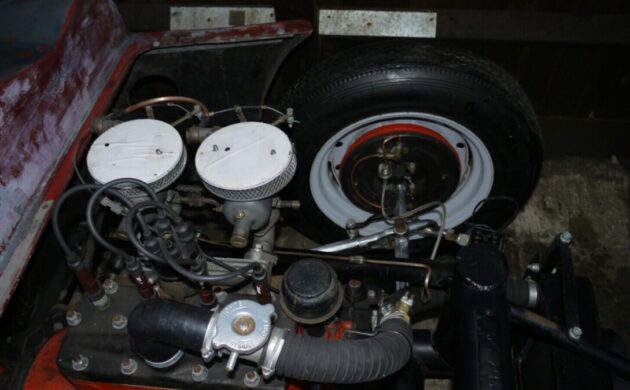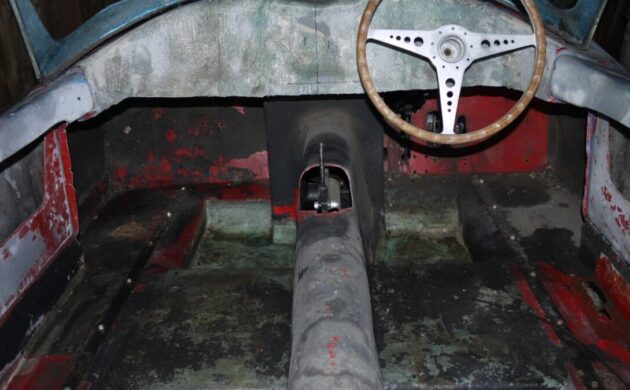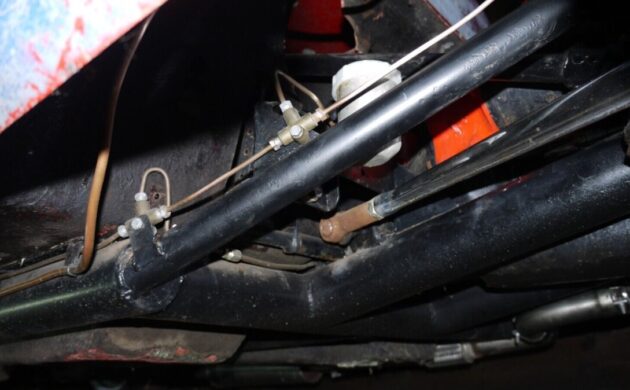The fiberglass kit and production car boom of the ’50s and ’60s gave us everything from the Corvette to the Bond Microcar. This rich ecosystem of vehicles both normal and niche was fostered by a relative lack of safety and manufacturing regulations, as well as tax regimes that allowed – nay, encouraged – a car to be a motorcycle. Of course, not all fiberglass kits were top shelf, apparently inspiring Bill Woodhouse and Tony Bullen to build their own kit car. The first of these was introduced in 1958, called the Typhoon. Only 300-400 Typhoons were made, some on English Ford chassis but many on an in-house tube chassis. After making but a few models, Tornado was sold in 1963 and subsequently folded. That wasn’t the end for Bill Woodhouse, however, who eventually landed a senior engineering position with Aston Martin. Here on eBay is a 1960 Tornado Typhoon project, with an asking price of £12,500, or about $15,000. The new owner will need to ship the bits from Warlingham, Surrey, England. We have Kyle K. to thank for this most excellent tip!
The engine Woodhouse chose for the Typhoon was an 1172 cc side-valve four-cylinder, not exactly a barnburner but economical. An Aquaplane manifold carries the two carburetors. The motor was good for about 30hp, though more could be squeezed out of its tiny passages with some effort. Typically the gearbox was a three-speed manual with synchros on second and third. The car uses a torque tube, making a motor swap problematic. This car’s motor, brakes, chassis, and wheels have been rebuilt or restored, leaving the buyer to deal with the interior, wiring, body, and paint. Fiberglass repair is an art, with symmetry difficult to achieve. Larger compound curve surfaces like this bonnet will test the buyer’s skills.
Speaking of the interior, it’s buyer’s choice regarding the gauges, seats, and steering wheel. A few parts are included – here are gauges. One owner, Tim Suddard of Grassroots Motorsports and Classic Motorsports fame conducted an extensive rebuild of a Typhoon, with an entry to the Amelia Island Concours d’Elegance as a reward for perseverance. Its interior is positively lush compared to other ’50s fiberglass cars. All Typhoons were right-hand drive.
The underside shows evidence of recent work. The seller supplies plenty of documentation with the car, including its mention in Hot Car magazine in 1969. I wasn’t able to find that Typhoons were ever fitted with a convertible top, so this is probably a tonneau. Needless to say, if you have your heart set on a Typhoon, you may have to wait a while to find one for sale, unless this one will do. Occasionally offered on the auction market, Typhoons seem to sell in the $30k to $40k area, judging by asking prices from a few years ago. This is an intriguing prospect, wish it didn’t live in England. Would you tackle this restoration?








Tim Suddard’s Car was in worse shape than this one but they turned it into a beautiful example of original craftsmanship. I think He’s still got the build on the Project Cars section of his classicmotorsports.com site.
Nice project.You should source an Aquaplane head also for more HP.
Have never seen SU (?) carbs in that position. Do they have to be removed to put oil in the dashpots, or do they just tip the car up? WARNING: it appears that copper tubing has been used for the brake lines. This is a definite NO-NO, as I’ve always been given to understand that copper lines will, eventually, fracture from road vibration.
In they UK we’ve been using cupronickel for brake pipes since the 70’s
Many still use copper brake lines and as to the SU downdrafts, my Bristol 400 has them and some other UK cars.
No oil problem.
SU made downdraft carbs
Our Renault and Peugeot were fitted with copper brake lines as OE. I assumed it was to counteract road salt in Europe.
The same argument about copper brake lines extended down here to Australia and the fact that copper brake lines were used by vehicle manufacturers that were sold and assembled in Australia doesn’t want to be accepted nowadays. I have broken up a few cars and kept the copper brake lines for their long lengths in case I needed a piece of tube some time.
100% copper tubing is not permitted in Britain as well as all steel brake lines because they tend to develop corrosion from the inside as well as the outside. The UK brake lines are an alloy of copper and nickel, and don’t corrode like the DOT/SAE steel lines. They also have a pressure rating equal to the US brake tubing, and meet all the European vehicle specifications. When I used to attend the Beaulieu AutoJumble [flea market for old cars] in the 1980s, I would look for rolls of brake line material, and bring them back to use on older British cars here in the USA.
I’ve owned 1950s & 60s British cars that still have their original brake lines, Yet my modern Ram pickup had to have ALL of it’s steel brake lines replaced because of internal corrosion, with less than 25,000 miles on the truck. When I ordered the complete brake line kit from a well-known supplier, the person I talked with told me it was common to replace modern US vehicle brake lines if the vehicle is allowed to sit for extended periods.
One of the problems with American vehicle standards is the outdated insistence that vehicles must use a specific product, and don’t permit other products that meet OR EXCEED the specification. The most glaring example was the US requirement of sealed-beam headlights for too many years, while the rest of the world developed far better headlight systems.
In they UK we’ve been using cupronickel for brake pipes since the 70’s
I wanna’ like this but it’s … caboose-challenged.
Bonhams sold a very nice one in 2009, some great photos and history here:
https://www.bonhams.com/auctions/17738/lot/153/
Great base for a poor man’s Cobra, nice lines, could be a great project👍😀🇬🇧
Author should fact check. I have imported two Bond minicars to USA, A 1954and 1956. They are aluminum, nit fiberglass. The Bond Bug was fiberglass though.
The Bond Equipe, the Bond 875, the Bond Bug – all used fiberglass. Bond was known for being one of the first British makes using fiberglass. Lawrie Bond went to Berkeley and used fiberglass. That is what I was referring to.
Not to pick nits, but the Bond Equipe was mostly a restyled Triumph Herald with a fiberglass front end. But other than a nut such as myself, who would know . . . or care.
The front end looks like a pontoon-fendered Testa Rossa TR-250 with the pontoons dialed back and the grille opening reduced to meet the needs of the smaller engine. The rear has a distinct Bertone Alfa BAT influence, something like the Bertone Giullietta prototype…which few had seen at the time, or even now.
I like the whole thing, and it looks so much better—in a Fifties sort of way—when finished properly.
If you want to see one in person, we have the ex-Classic Motorsport’s Typhoon on display at Lane Motor Museum. Seating position is challenging if you are even close to being tall, but that might be variable depending on what seats one chooses for this one. https://www.lanemotormuseum.org/collection/cars/item/tornado-typhoon-1958
Some great workmanship and so poor, some great parts and some poor parts. Nice details but red electrical tape “Just get a new wire please” Great work but used VW wheels and hubs could have used a nice disc brake system. I like it but too pricey as it would need a start over to know that it is all safe to use
I suspect those are 16″ Ford Popular or Anglia wheels and probably mechanical drum brakes.
I owned one for a while. These are real heavweights…literally. We removed the body to restore it, and the body weighed over 500 pounds. Heaviest fiberglass body we have ever had here, and one of my least desirable of the 150+ ‘glass bodies I have owned and worked on. Kind of crude, and heavier than a LaDawri or Wildfire. More than two or three times the weight of a Devin Sold it to a fellow in the UK and we sent it back to him.
Too many missing parts for the asking price. Pass!
Side shot sort of looks like the “Special” Tony Curtis drove in the movie “Johnny Dark” about 1954.
“…1172 cc side-valve four-cylinder,…”
to me that’s an angilia (ford) made till ’62/3. Not sure the utility fora ‘sports car’ (low HP).
Glass is actually a great media, no torches or welder needed. Only better 2 me is alu. Easy to form, or template so symitry is no big deal (I use a 1 demential ghost or template’n just hold it up there).
Love the basic idea here (chassy’n body ‘style’) and would twique the former and drive train. Some guys (bertone, farina) can just design so very nice !